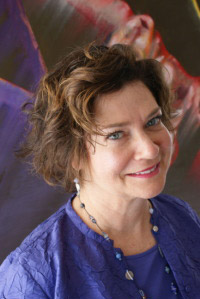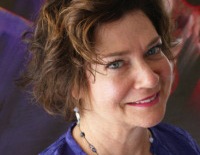 Celeste Schenck is the President of The American University of Paris (AUP). Born to a Russian father and a Irish-Canadian mother, Schenck has traveled extensively all her life. Her nomadic experience began at age 10 when she moved from Florida to France to attend French and Swiss boarding schools, which started a life-long love affair with France. “There was some feeling that I belonged in this country that established itself when I was a 10-year-old,” she said in an interview last winter. “Even though I came back to the States and didn’t go back for another 10 years, I was always preparing to go back… My parents remember my telling them when I was 10 years old that I would never just be the citizen of one country.” A graduate of Princeton University, Schenck received her PhD from Brown University and taught at Barnard College soon after. She has spent the last 20 years at AUP, becoming president in 2008. The university has 1,000 students and 110 faculty from 26 different countries, making it the perfect school for Third Culture Kids.
Celeste Schenck is the President of The American University of Paris (AUP). Born to a Russian father and a Irish-Canadian mother, Schenck has traveled extensively all her life. Her nomadic experience began at age 10 when she moved from Florida to France to attend French and Swiss boarding schools, which started a life-long love affair with France. “There was some feeling that I belonged in this country that established itself when I was a 10-year-old,” she said in an interview last winter. “Even though I came back to the States and didn’t go back for another 10 years, I was always preparing to go back… My parents remember my telling them when I was 10 years old that I would never just be the citizen of one country.” A graduate of Princeton University, Schenck received her PhD from Brown University and taught at Barnard College soon after. She has spent the last 20 years at AUP, becoming president in 2008. The university has 1,000 students and 110 faculty from 26 different countries, making it the perfect school for Third Culture Kids.
1. Why did you choose to build a career in academia?
I was the kind of kid who organized the entire neighborhood into a schoolroom that we had behind the house and gave everyone assignments and grades. I think I was sort of a born pedagogue. So I never really considered anything else. I went straight to graduate school from college, and after two and a half years of graduate school, I started teaching at Barnard.
2. How did your Third Culture Kid upbringing help you in your career?
It helped me in all of my life choices. I wouldn’t be the same person today if I hadn’t lived in two different places. I’m absolutely convinced the places you take a child before they are 16 years old have an incredible impact on their lives, not only because you can learn languages without an accent before the age of 10 or 12, but because children enter into another culture and it becomes part of their repertoire. They can play all 88 keys on this piano, and very often it has an impact on your comfort level in crossing cultural borders later. I always thought of myself as someone who held two kinds of citizenship.
3. How has being a Third Culture Kid held you back in your career?
The only downside is that you sometimes feel like you neither belong here nor there. There are moments when you straddle the ocean and you feel like you need both cultures because they are both parts of who you are. It’s condemning me to living my life between the United States and Europe.
4. What advice would you give to Third Culture Kids starting out their careers?
You have to make some choices, and you have to put down some roots. I would be very thoughtful about where you want to begin doing some of your first job searches. Part of the problem with the resumes of people like us – Third Culture Kids – is that it can look like we move around a lot and don’t put down roots or make a commitment to one place or another. You want to stay long enough in one job. We have a tendency sometimes to be restless, but you want to stay long enough in one job that you can demonstrate that you’ve moved to the next level, and that the reason you’ve moved to another job is really an opportunity.
5. What’s it like being at The American University of Paris?
We have no national majority, and we’re kind of a third place. We have an American curriculum, but we live in France, so we’ve integrated French entirely across the curriculum. We’re kind of a hybrid place, and everyone here is a language learner. Our classes over the last 10 years have brought 93 dialects and languages. If you add faculty to that, we’re up to 104. It’s amazing. There’s a lot of tolerance and interest in each other’s cultures.
We tend to get a lot of students – I call them refugees, a Third Culture Kid who grew up in Paris, goes back to the U.S. for college and feels like a fish out of water. Then they come to AUP and feel like they are in an environment where people come from all over … and there’s a certain way of relating to one another that transcends wherever you may come from.
6. What career advice do you give to your students?
I tell them all the time that I think they are the best prepared individuals I know for the contemporary job market. … People who study and work and learn together, alongside one another where they’re given opportunities to learn across their differences – differences in level of English, differences in cultural background, differences in ideology and faith and their religious background. They have a tendency to engage. A lot of our students go into careers in social justice, in humanitarian careers, they join international agencies. There’s a pretty large portion of our students who are very committed to the world and I’m very proud of that. What we try to do is encourage them: When you are so much of the world, you have a responsibility for the world. And we really do encourage them to live that out and make career choices that reflect that.
7. What’s a typical day for a president look like?
It is insane. Whatever you’ve planned goes out the window because, inevitably, when you’re sitting in the bosses’ seat, whatever unsolvable problems that have made their way up the chain of command end up on your desk. There are always two or three things that in happen in a day that I have no control over that just happen. But, I try to start my day every morning with a couple minutes of meditation.
The great thing about being a university president is that you’re leading an orchestra, and you have all these fabulous players. You have an interpretation of the score, and everyone has a place. You can pull up the bass, pull up the violins, slow the pace down when you need to and raise the pace when you need to. … It’s very satisfying work – I mean, what could you do in the world better than create an environment for young people to learn in? I just can’t think of anything better I could do with my life.

Reading your content is big pleasure for me, it deserves to go viral, you need some initial traffic
only. If you want to know how to get it search for: blackhatworren’s strategies
LikeLike